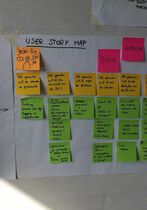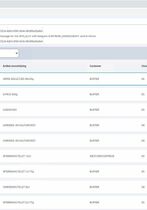- Work/
- Belgian Pork Group

Belgian Pork Group
Our approach
Discovery (light)
We organised a light version of our Discovery Bootcamp to map which devices were part of the system: printers, scanners, scales, and more. By looking at how those devices should communicate with each other, we created a system landscape. This allowed us to gain a faster and better understanding of the complicated situation. By using personas, we could imagine ourselves as operators and design the user interface accordingly.
The result
Together with the client, we developed Westcom 2.0, a web application based on their existing in-house software suite. The web app uses Angular for its frontend and .NET Core for its backend. One of the key advantages of Westcom 2.0 is deployment: each location has its own server that distributes the software, instead of each PC in that location requiring a separate installation.
Another advantage is the improved ease of use for operators and other end users, thanks to the updated interface. Our 2.0 application features improved communications logging of the landscape’s various devices. Logging has its own dedicated section that provides real-time updates, so users can track packaging lines. This leads to improved support efficiency and faster response times in case of trouble.
Development
We put together a co-creation team along with the client: two frontend developers, two backend developers and a scrum master on our side, and a product owner and functional analyst on their side. We developed Westcom 2.0 for four months using the agile and scrumban methods, which meant short feedback loops with frequent reviews. This ensured that we could detect and fix problems a lot faster.
During development, the client was still building robot-operated packaging lines, which meant that elaborate testing was not possible right away. To remedy this, we opted for week-long testing sprints where we collaborated with the robot’s supplier to make precise modifications to the software.
- Gregory Pyck (Operational IT manager)“We decided on a .NET environment, and in Sweet Mustard, we found a local partner to guide us through the process. They delivered with a young, enthusiastic, and well-organised team that made an agile approach possible.”

Looking back
Looking back from the client’s perspective
We really wanted a partner that could handle this project using the scrum method because of its complexity and the constantly changing planning. Flexibility was key since it’s part of a bigger whole. There were construction works going on for a new automated production line in addition to the existing one that needed to stay operating. The project also had a lot of stakeholders that needed to be educated and involved in the process: production employees, planners, automation implementers, and project managers.
We’re so thrilled with Sweet Mustard’s agile approach to software development that we trusted them with our next project. We’re sure they will deliver just as well as with Westcom 2.0.

